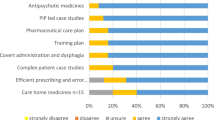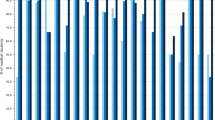Abstract
Objective To explore the views and experiences of pharmacists and their mentoring designated medical practitioners (DMPs) about the ‘period of learning in practice’ (PLP) as part of supplementary prescribing (SP) training. Method Two focus groups (n = 5 and 7) of SP pharmacists were organised in Scotland. The experiences and views of DMPs (n = 13) were explored using one-to-one telephone interviews. The focus groups and interviews were transcribed verbatim and analysed using the framework approach. Main outcome measures Views and experiences of pharmacists and DMPs about the PLP. Results Planning the PLP in consultation with the DMP was found to be crucial for an optimal learning experience. Pharmacists who did not have a close working relationship with the medical team had difficulties in identifying a DMP and organising their PLP. Participants stressed the importance of focusing on and achieving the core competencies for prescribers during the PLP. Input from doctors involved in the training of others, review of consultation videos, and formal independent assessment including clinical assessment at the end of the PLP might improve the quality of the PLP. Forums for discussing experiences during the PLP and gathering information might be valuable. Conclusion Our findings have implications for prescribing training for pharmacists in the future. The PLP should focus on core competencies with input from doctors involved in the training of others and have a formal assessment of consultation skills. Support for pharmacists in organising the PLP and forums for discussing experiences during the PLP would be valuable.
Similar content being viewed by others
References
Crown J. Review of prescribing, supply & administration of medicines. Final report. London: Department of Health, 1999.
The Health and Social Care Act 2001. 2000–2001 ed, 2001. ISBN 0105415014.
George J, McCaig DJ, Bond CM et al. Supplementary prescribing: early experiences of pharmacists in Great Britain. Ann Pharmacother 2006;40(10):1843–50.
Department of Health: Supplementary Prescribing by Nurses, Pharmacists, Chiropodists/Podiatrists, Physiotherapists and Radiographers within the NHS in England: A guide for implementation. London: HMSO, 2005.
Royal Pharmaceutical Society of Great Britain: Outline Curriculum for Training Programmes to prepare Pharmacist Supplementary Prescribers. London, 2002.
Granby T, Picton C. Maintaining competency in prescribing: an outline framework to help allied health professional supplementary prescribers. Liverpool: National Prescribing Centre, 2004.
George J, McCaig D, Bond C, Cunningham S, Diack H, Stewart D. Benefits and challenges in delivering supplementary prescribing: perceptions of early pharmacist prescribers in Great Britain. Int J Pharm Pract 2007;15:23–30.
Pope C, Ziebland S, Mays N. Qualitative research in health care: analysing qualitative data. BMJ 2000; 320(7227):114–116.
Hobson RJ, Sewell GJ. Supplementary prescribing by pharmacists in England. Am J Health Syst Pharm 2006;63(3):244–53.
Williams C, Cantillon P, Cochrane M. Pre-registration house officers in general practice: the views of GP trainers. Fam Pract 2001;18(6):619–21.
Scottish supplementary prescribers get clinic funds. Pharm J 2005;275:73.
Child D, Cantrill JA. Hospital doctors’ perceived barriers to pharmacist prescribing. Int J Pharm Pract 1999;7:230–237.
Day M. UK doctors protest at extension to nurses’ prescribing powers. BMJ 2005;331:1159.
Verma S, Paterson M, Medves J. Core competencies for health care professionals: what medicine, nursing, occupational therapy, and physiotherapy share. J Allied Health 2006;35(2):109–15.
The Medicines for Human Use (Prescribing) (Miscellaneous Amendments) Order. 2006.
Department of Health: Improving Patients’ Access to Medicines: a Guide to Implementing Nurse and Pharmacist Independent Prescribing within the NHS in England. Leeds, 2006.
George J, Pfleger D, McCaig D, Bond C, Stewart D. Independent prescribing by pharmacists: a study of the awareness, views and attitudes of Scottish community pharmacists. Pharm World Sci 2006;28(2):45–53.
Royal Pharmaceutical Society of Great Britain: curriculum for the Education and Training of Pharmacist Supplementary Prescribers to become Independent Prescribers. London, 2006.
Acknowledgements
We thank Brian Addison, Laura Binnie and Antonella Tonna for their help with the study and Amber Bowbyes for transcribing the interviews. We acknowledge all pharmacists and medical practitioners who contributed to this study.
Funding
This study was funded by a mini-project grant from the Pharmacy Practice Research Trust of the Royal Pharmaceutical Society of Great Britain.
Conflict of Interest
None declared.
Author information
Authors and Affiliations
Corresponding author
Rights and permissions
About this article
Cite this article
George, J., Cleland, J., Bond, C.M. et al. Views of pharmacists and mentors on experiential learning for pharmacist supplementary prescribing trainees. Pharm World Sci 30, 265–271 (2008). https://doi.org/10.1007/s11096-007-9172-5
Received:
Accepted:
Published:
Issue Date:
DOI: https://doi.org/10.1007/s11096-007-9172-5




